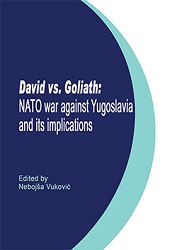CLASSICAL THEORIES OF AIRPOWER AND THE NATO WAR AGAINST THE FR YUGOSLAVIA IN 19991
CLASSICAL THEORIES OF AIRPOWER AND THE NATO WAR AGAINST THE FR YUGOSLAVIA IN 19991
Author(s): Nebojša Vuković, Branislav Đorđević
Subject(s): Politics, Security and defense, Military policy, Peace and Conflict Studies
Published by: Институт за међународну политику и привреду
Keywords: air power; war; NATO; Yugoslavia; strategy
Summary/Abstract: The first part of the paper describes and explains the classical theories of airpower which occurred during the period between the two world wars. The main hypothesis of the paper is that the NATO war against the Federal Republic of Yugoslavia represented the actualization of the key assumptions of these theories and the predictions of their authors. The auxiliary hypotheses are contained in the view that NATO achieved its goals in the war primarily with a strategic bombing – destruction of infrastructure, electricity network and industrial potential. The FR Yugoslavia represented an ideal target for the conduct of the air warfare because due to its relative development, it was highly dependent on this infrastructure, networks and potentials, while on the other hand, it did not possess the capacity to defend itself from the NATO air strikes. One of the hypotheses of the paper is that the 1999 war has confirmed the convictions of the authors of the classical theories of airpower stating that the land forces are less relevant in modern armed conflicts involving technologically advanced nations. Finally, the paper also states that recourse to air warfare is only possible under certain (specific) conditions - complete isolation of the targeted country, its inadequate air defence system capacity, vulnerability to a significant degree of damage to its infrastructure.
Book: DAVID vs. Goliath : NATO war against Yugoslavia and its implications
- Page Range: 385-399
- Page Count: 15
- Publication Year: 2019
- Language: English
- Content File-PDF

